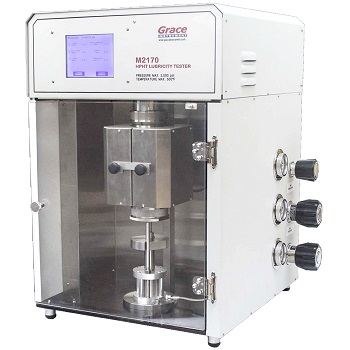Lubricity Tester
M2170 HPHT Lubricity (Tribology) Tester
- Height: 27.5 in.
- Width: 18 in.
- Depth: 21 in.
- Weight: 250 lbs.
- Max Pressure: 2,000 psi | Max Temp: 500°F (260°C)
- U.S. Patents: 9,194,784
Determine lubricating quality of drilling fluids
The M2170 HPHT Lubricity (Tribology) Tester offers a
computer-controlled test environment which can
realistically simulate downhole conditions of temperature
and pressure while allowing the user to perform HPHT lubricity tests on solid to solid surfaces with liquid or particulate
lubricants.
The M2170 is the only lubricity (tribology) tester currently available
in the USA that is designed to test lubricity performance
on different types of drilling fluids such as oil-based,
water-based, and synthetic-based drilling fluids at high pressure
and high-temperature conditions.
Fully customizable, completely user controlled
The M2170 HPHT Lubricity Tester tests the lubricity of a
sample fluid by axially rotating a rubbing shoe while a
metal or core sample is pressed against it. As the
rubbing shoe wears away the surface of the sample, the
rotating torque and upward force yield the friction factor
and lubricity.
Under dynamic testing operations, the M2170 is
capable of producing dependable test results that
simulate highly realistic conditions, which can be used to
evaluate proper mud systems, drill-string design
techniques, or determine optimal lubricant additives. The
data is collected through custom PC software and is
completely user-controlled. Analysis from this data helps
the operator predict, improve, or minimize the role of drilling
fluid techniques within oilfield operations.
We also offer the M2200 HPHT Lubricity (Tribology), Dynamic Filtration, & Drilling Simulator.
| Dimensions: 27.5" Height x 18" Width x 21" Depth |
| Weight: 250 lbs |
| Temperature Range: Amb. to 500°F (260°C) |
| Working Pressure: 2,000 psi |
| Max Torque: 42.5 pound/inch (4.8 N.m) |
| Max Power Requirement: 1,800 watts |
| Heater Power: 1,200 watts |
| Power Supply: 120/240 V, 50/60 Hz |
| Sample Volume: 400 mL |
| Filtrate Volume: 50 mL |
| Shear Bob Speed: 0 to 600 RPM |
- The M2200’s very repetitive COF (coefficient of friction) measurement of ±0.01 is due to its unique, patented design
- Fully customizable test parameters
- Automatic pressure & temperature control
- Automatic data collection
- Measurses fluid lubricity of various lubricants
- In accordance with API Recommended Practice 10B-2
- Maximum Speed up to 600 RPM
Downloads for the Lubricity Dynamic Filtration Drilling Simulator:
Read more about our instrument's technical applications within these scientific and academic publications:
-
Nafta-Gaz, 2023, R. 79 No. 3, 157-170 2023
Drilling mud based on synthetic polymers with the addition of nanomaterials adapted to borehold conditions
Filtration of cores with a porosity of 20 μm were performed with a Grace M2200 Lubricity Tester.
https://yadda.icm.edu.pl/yadda/element/bwmeta1.element.baztech-299fde88-2236-424e-b9cc-9a9834b57a78?q=bwmeta1.element.baztech-dabc15aa-0811-42ff-85d7-002a9bbc6808;1&qt=CHILDREN-STATELESS
-
Nafta-Gaz, 2023, R. 79 No. 3, 171-183 2023
Influence of washing liquids on the quality of cementing pipes after using drilling muds with different hydration inhibition mechanisms
A Grace M2200 Lubricity Tester was used to produce mud sluge under hole-like conditions.
https://yadda.icm.edu.pl/yadda/element/bwmeta1.element.baztech-f2f65e6e-845a-48a3-968c-a7faaed177b4
-
Nafta-Gaz 2022, nr 5, s. 375-385 2022
Polymers, synthetic, for regulating the filtration of drilling muds under elevated temperature conditions
Dynamic filtration results from synthetic polymers used to regulate drilling fluids were measured using a Grace M2200 Lubricity Tester.
https://www.inig.pl/magazyn/nafta-gaz/Nafta-Gaz_2022-05-05.pdf
-
Nafta-Gaz 2019, nr 5, s. 275-282 2019
Possibilities of improving the lubricity properties of drilling muds used in industrial conditions
Dynamic fluid invasion experiments were conducted using the M2200 drilling simulator. Effectiveness tests of four lubricants in drilling fluids were tested using a Grace 2200 Lubricity Tester.
https://www.inig.pl/magazyn/nafta-gaz/Nafta-Gaz_2019-05_5.pdf
-
Journal of Petroleum Exploration and Production Technology, March 2019, Volume 9, Issue 1, 281-296 2019
Smart Lost Circulation Materials for Productive Zones
Dynamic fluid invasion experiments were conducted using the M2200 drilling simulator.
https://link.springer.com/article/10.1007%2Fs13202-018-0458-z
-
Journal of Energy Resources Technology, January 2019, Volume 141, Issue 7 2019
A Holistic Approach to Characterize Mud Loss Using Dynamic Mud Filtration Data
The dynamic mud filtration experiments were performed using the M2200 drilling simulator.
http://energyresources.asmedigitalcollection.asme.org/article.aspx?articleid=2719407
-
ARMA-2018-544 2018
Pore-Scale Mud Invasion in Different Rock Samples and Wellbore Conditions: Implications for Lithology Dependent Wellbore Strengthening
M2200 drilling simulator was used to perform the dynamic-radial mud invasion experiments.
https://onepetro.org/conference-paper/ARMA-2018-544
-
SPE-189596-MS 2018
A New Approach to Characterize Dynamic Drilling Fluids Invasion Profiles in Application to Near-Wellbore Strengthening Effect
Dynamic fluid invasion experiments were conducted using the M2200 drilling simulator.
https://onepetro.org/conference-paper/SPE-189596-MS
-
SPE-189509-MS 2018
Integrated Image Processing and Computational Techniques to Characterize Formation Damage
Dynamic fluid invasion experiments were conducted using the M2200 drilling simulator. The advantage of using this approach is that it simulates drill pipe rotation with drilling mud inside the inner diameter of a core.
https://onepetro.org/conference-paper/SPE-189509-MS
-
SPE-189471 2018
Investigating Impact of Rock Type and Lithology on Mud Invasion and Formation Damage
Characterizing water based mud’s invasion and damage to different rock cores representing various lithologies, under simulated dynamic wellbore condition. M2200 has been used to simulate dynamic wellbore condition as a drilling simulator, capable of rotating a shaft that is centered between the inner diameter of the damaged porous media. Using this approach, the formation damage profile of WBM on different lighologies was investigated.
https://onepetro.org/conference-paper/SPE-189471-MS
-
Journal of Natural Gas Science and Engineering, Volume 51, March 2018, 104-115 2018
Experimental and statistical investigation of drilling fluids loss in porous media-part1
Dynamic fluid invasion experiments were conducted using the M2200 drilling simulator.
https://www.sciencedirect.com/science/article/abs/pii/S1875510017304948
-
Journal of Petroleum Science and Engineering, December 2018, Volume 171, 1326-1337 2018
Lost circulation and filter cake evolution: Impact of dynamic wellbore conditions and wellbore strengthening implications
Dynamic fluid invasion experiments were conducted using the M2200 drilling simulator.
https://www.sciencedirect.com/science/article/abs/pii/S0920410518307290
-
OMAE2018-78722 2018
Qualification of Multiple Factors and Interaction Effects on Drilling Fluid Invasion
The dynamic drilling fluid invasion experiments were carried out on the M2200 drilling simulator.
https://doi.org/10.1115/omae2018-78328
-
AADE-17-NTCE-094 2017
How does Rock Type and Lithology Affect Drilling Fluid’s Filtration and Plastering
Highlight and justify the importance of lithology and rock type, on dynamic mud filtration and plastering. M2200 has been used to characterize dynamic drilling fluid filtration, for different lithologies, at specified experimental conditions.
http://www.aade.org/app/download/7246175691/AADE-17-NTCE-094+-+Ezeakacha.pdf
-
AADE-17-NTCE-100 2017
Evaluation of Measurement Techniques for Fluid Lubricity in the Laboratory
Perform a comprehensive study on measurement techniques to evaluate lubricants and the lubricity of drilling fluids. M2200 has been used to perform dynamic lubricity test under varied experimental conditions.
http://www.aade.org/app/download/7246210373/AADE-17-NTCE-100+-+Zhou.pdf
-
Composition and Properties of Drilling and Completion Fluids (Seventh Edition), 55-91 2017
Chapter 3 – Evaluating Drilling Fluid Performance
Figure 3.15 M2200 HPHT lubricity, dynamic filtration, and drilling simulator
https://www.sciencedirect.com/science/article/pii/B9780128047514000031
-
International Scientific and Technical Conference 2017
Examination of Drilling Muds Lubricity on Contact with Borehole Wall under HPHT Conditions
The studies were conducted based on the measurement of the coefficient of friction using a Grace M2200 HPHT drilling simulator. The coefficient of friction was determined on steel-steel contact and steel-sandstone contact.
http://194.44.112.14/bitstream/123456789/5964/1/6564p.pdf
-
University of Leobon Master Thesis 2017
Experimental Design to Investigate the Casing Smearing Effect
Lubricity, Filtration, Drilling Simulator – M2200: This apparatus features a temperature and pressure controlled work environment to simulate downhole conditions. The filter medium is available in different porosities and permeabilities. A shear bob can simulate the rotation of the drill string concentric or off-centre. This produces a certain shear rate on the filter cake. In an optional version, there is even a mud circulation system applied but only for lower pressures and temperatures. The main advantage of this apparatus is that it can rotate a shear bob off-centre, which is exactly what happens during CwD. Nevertheless, it is important to find out if the rotation is simply off-centre or if it performs a similar motion as during CwD. This would mean regular contact with the filter medium during rotation. If so, this would be the only apparatus which could simulate CwD conditions realistically so far.
https://pure.unileoben.ac.at/portal/files/1862343/AC13686645n01vt.pdf
-
ARMA 15-82 2015
American Rock Mechanics Association
An Integrated Analytical Workflow for Analyzing Wellbore Stress, Stability and Strengthening
Present an integrated and analytical workflow, such as performing an integrated mud loss volume prediction based on different mechanism. M2200 has been used to do filtration test and generate mud cake for property test.
https://www.onepetro.org/conference-paper/ARMA-2015-082


